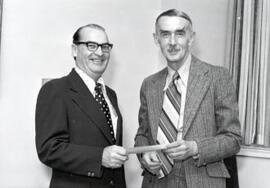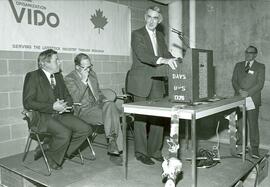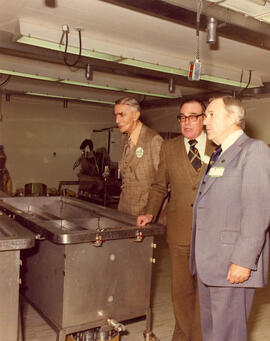R.W. Begg, University President, speaks from podium during the opening of the Vaccine and Infectious Disease Organization (VIDO). Dignitaries seated are (l to r): M. Moore; Herman Rolfes, Saskatchewan Minister of Continuing Education; and Dr. Chris Bigland, director of VIDO.
Bio/Historical Note: The Vaccine and Infectious Disease Organization (VIDO) is a research organization of the University of Saskatchewan that operates with financial support from the Government of Canada, the government of Saskatchewan, livestock industry councils and agencies, foundations and human and animal health companies. VIDO worked to find cures for common infectious diseases in cattle, swine and poultry. VIDO scientists carved out an international reputation for their pioneering work in the 1980's on vaccines aimed at combating shipping fever and a disease which produces pneumonia and arthritis in cattle. In addition to the 2,500,000 sq ft facility on campus, VIDO-InterVac also operates a 160-acre research station. The laboratory took on its current name, International Vaccine Centre (VIDO-InterVac), in March 2003. In October 2003 a large expansion was completed. In March 2004, VIDO received funding for the construction one of the world's largest and most advanced biosafety level 3 facilities, the International Vaccine Centre (InterVac), for research into emerging and reemerging human and animal diseases. In 2020, VIDO-InterVac began developing a vaccine for SARS-CoV-2 during the COVID-19 pandemic.



